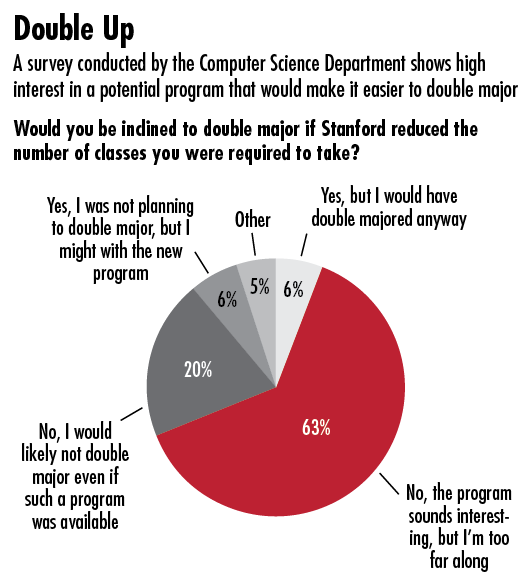
Starting next fall quarter, Stanford will offer undergraduates the opportunity to pursue a joint major in computer science (CS) and another humanities major, following the initiative’s approval by the Faculty Senate in February.
The initiative’s pilot offerings will combine computer science with either English or music, though a more diverse selection may be featured in the future.
The new program’s structure will be distinct from both double majors and dual degrees. Students who choose to pursue the joint major will not be expected to complete the full requirements of either of the two majors, but will instead conclude their educational experience with “capstone” interdisciplinary courses or projects.
According to Nicholas Jenkins, associate professor of English and director of the CS+X initiative — which eventually developed into the joint major program — many humanities departments are interested in participating in the joint major program.
“CS is becoming an integral part of many humanities majors, and the humanities are becoming important in CS,” Jenkins said. “There’s a lot of two way traffic and we hope that all these bridges will help transform not only the humanities, but also the computer sciences. We’re hoping that starting in September this year, there will be a whole raft of CS and humanities joint majors.”
Jenkins credited the push for the joint major program to Professor of Computer Science Eric Roberts, who advanced the idea of bringing together two disciplines in a fashion that wasn’t too academically rigorous to students.
“It’s a wonderful thing to integrate two fields of knowledge and find in that interstitial between two fields a really wonderful new set of ideas and that’s exciting,” Roberts said. “Most real progress comes at the intersection.”
Roberts recalled encountering significant faculty interest last spring when he first proposed the idea. A Computer Science Department survey of all CS majors and students who had taken the introductory CS106A class during the 2012-13 academic year, according to Professor of Computer Science Mehran Sahami ’92 M.S. ’93 Ph.D. ’99, found that 63 percent of students would be more likely to double major were Stanford to offer a program that reduced the number of classes required for each major by two courses.
Roberts subsequently reached out to humanities departments, with the intent of encouraging students who were originally interested in the humanities — but who for various reasons ended up majoring in CS for “marketability” or “practicality” reasons — to pursue their passions and increasing accessibility to larger majors like economics which might have been too demanding otherwise.
Faculty members conceded that the program’s implementation might strain the Computer Science Department’s resources.
“Making sure that the students get good advising is going to be a challenge,” said department chair Jennifer Widom. “Making sure that we don’t grow so fast that we get overwhelmed is something to worry about.”
Widom explained that the current number of undergraduates in CS has tripled from a few years ago. Although students’ academic interests have largely remained the same over time when matriculating, a progressively larger number of students have switched to computer science over the course of their undergraduate career.
“[The joint major program] is one way we can address students that have CS and another passion,” Widom said.
Widom disputed, however, the concept that the development of a joint major program linking computer science with various humanities subjects means that the humanities are dying out.
“We’re not too worried about that,” Widom said. “We realize that computing and data is becoming more and more important, and it’s being validated on the undergraduate level.”
In fact, many faculty members, including Widom, argued that the joint major program might help decrease the apparent “fuzzy-techie” divide that exists at Stanford.
“We’re all at one university together. I don’t know how real [the fuzzy-techie divide] is, but here’s something holistic that would be a real benefit for the students,” Jenkins said. “I think that’s important for the general mood of the University, for people not to feel forced to feel like they have to be on one side of the fence or the other.”
Jenkins also asserted that the joint major program will be important for the broader University, especially in terms of developing a new kind of intellectual culture.
“I believe that this is a positive way to reconceptualize what the humanities can do and also for other disciplines,” Jenkins said. “People watch Stanford and they look at what we’re doing, so I think in my opinion, we should be the ones doing the experimenting—bringing CS and the humanities together to the next level.”
Contact Catherine Zaw at czaw13 ‘at’ stanford ‘dot’ edu.